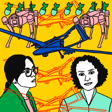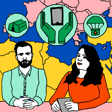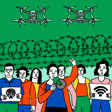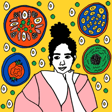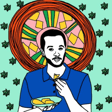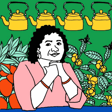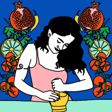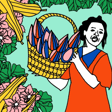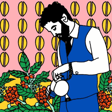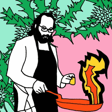Middle Eastern Wines and Native Foods
00:00:00
Speaker
We don't get enough space when it comes to sales, when it comes to wine lists, when it comes to restaurants. For some reason, we're always put in this category of our wines go with our food. We don't even consume our wines that way. We don't really drink wine with our food the same way that these other countries do. So where did this come from? This whole, our wines should
00:00:29
Speaker
be with our food kind of thing.
Season Two Wrap-Up and Future Topics
00:00:36
Speaker
Hi all, this is the last episode of season two of instant coffee where we explored food in the region. We hope you enjoyed listening and that it helped rediscover some of your favorite dishes. There were a lot of ideas that we wanted to explore and a lot more countries that we wanted to visit but didn't get the chance to.
00:00:51
Speaker
We hope to be able to bring these discussions into later seasons and maybe even into our research at the Middle East Centre. This season was a bit food heavy. We did get to speak to Ferris Chibani about coffee, but there are many other iconic drinks in the region that we didn't cover.
Farah Peru's Journey in Wine Media
00:01:05
Speaker
But we did get the chance to talk wine with Farah Peru.
00:01:08
Speaker
Farah is behind B for Bacchus, a media platform and podcast featuring wine stories from the Fertile Crescent. Farah is also a contributing editor to The Wine Zine, a print publication about natural wine. She told us more about how she got into the wine scene.
00:01:24
Speaker
I had started working with my parents for our retail business and my dad wanted to start a alcohol section and he was like, you run this, figure it out. And I didn't know anything about that at the time, but he was like, just do it. And so I started taking some classes, doing some certifications and I found that
00:01:44
Speaker
The world of wine has such an interesting entry point to so many different things when it comes to the history of a place or of people. Because in a way, it's just another food way. Agriculture, history, science, design, art. Basically what I'm doing isn't even really about wine itself. It's a mixture of things. And wine is just the device to do it.
Promoting Diverse Voices in Wine Writing
00:02:08
Speaker
No, as far as wine writing, it's definitely a new facet of the stuff that I do. One of the distributors in the US asked me if I could write a piece for this magazine based in the US. They wanted to do a profile on one of the wineries that I was familiar with. And I said, sure, OK. And that was right before lockdown.
00:02:29
Speaker
And I got along really well with the editor in chief of that magazine and she brought me on as a contributing editor to cover the region in specific, which was great because we don't get enough of that and we don't have someone who can really push for that, but also bring in people from our own region, highlight our own voices, lift them up and try and talk about our own stories.
00:02:54
Speaker
Farah's publications are fun and visually appealing magazines full of colorful doodles and illustrations while also tackling complex historical and contemporary analysis of the wine world. We asked Farah if she's been writing about wine for long and also what the writing scene looks like
Diversity Challenges in Wine Writing
00:03:10
Speaker
today. Are people from the region taking part? The impression I get of the wine writing world is that it is a bit lacking in different voices.
00:03:20
Speaker
But at least in the US, I've seen that there is a burgeoning underground of people that are trying to change that. And there's different collectives and there's different voices that are challenging that old white image that is usually associated with the wine world. There are a lot of people in minorities or the global majority, as we should say, that are trying to push back on that and deconstruct this snobby fedora cigar smoking
00:03:48
Speaker
image you have when it comes to people who consume wine or they read about it. From talking to Farah it seems like there was or still is a fear around wine writing. People seem worried about being firm in their conviction about which wines they like if they don't align with the wine world. As a student I worked in some of my restaurants to earn some money and I became interested in the wine there and I kind of resonated with it for the details of production and flavor and all the rest and had a good memory
00:04:18
Speaker
for it and had an inability to articulate what I was tasting in a certain way. So that kind of, I think that helped. When I was pitching stories early on in my writing career, I think the fact that I didn't find wine intimidating was an advantage. Pre blogs and early internet type stuff when people really started to post. You know, a lot of writers who wrote about food didn't feel comfortable writing about wine. There was something that seemed to be particularly esoteric or specialist about even though they might know quite a bit about it,
00:04:47
Speaker
And I didn't seem to have that aversion or that fear. That's Jamal Reyes, a writer, editor, and educator, and a pioneer in covering Middle Eastern wine.
Jamal Reyes on Palestinian Heritage in Wine
00:04:57
Speaker
Growing up in a household with a Palestinian Armenian mother and a Palestinian Arab father from Gaza, Jamal told us about how his background and politically active family have informed his work. In the late 80s, I went and spent time in Palestine, not for the first time. I'd been there when I was quite young.
00:05:17
Speaker
I spent time in Palestine, in Gaza in particular, and this was in Tifada days, so of course there was no, there was no whining and dining going on. But nonetheless, I mean, the politics, the culture and all the rest really resonate with me very profoundly. And it only seemed natural that if I was going to write about food and write about wine, I would spend some attention to that.
00:05:43
Speaker
Farah and Jamal both have strong links to the region which help inform the way they think about Middle Eastern wine, an important quality needed for accurate wine writing.
Stereotypes in Promoting Middle Eastern Wines
00:05:52
Speaker
But promoting Middle Eastern wine abroad is still very difficult. Wines from the region are seen as add-ons to the food and would only make appearances on menus of restaurants. We don't get enough space when it comes to sales, when it comes to wine lists, when it comes to
00:06:10
Speaker
restaurants, for some reason, we're always put in this category of our wines go with our food. Whereas you don't really see that when it comes to French and Italian wines. Like no one says, oh, they should only be in French and Italian restaurants. Why is it the case for us when we don't even consume our wines that way?
00:06:29
Speaker
We don't really drink wine with our food the same way that these other countries do. It's mostly Ida or spirits that we would drink, if at all. So where did this come from? This whole, our wines should be with our food kind of thing.
00:06:47
Speaker
Many of the wineries in Lebanon used to say that that was their entry point to the market was trying to get their wines into Lebanese restaurants in the US. And that was usually because they had contacts there or because it just made sense that you would have wine from the country in this restaurant, especially if you had many people coming in to get a taste of their country and like feel like they're at home again.
00:07:09
Speaker
I don't think that it's fair that our wines should be only seen when we're talking about our own cuisine. They should be able to compete with all other wines. It's almost like saying they're not good enough yet. Part of the old way of approaching wine, as Farah calls it, is always referencing Old World wines as the gold standard. Old World wines are produced mostly in Europe, in countries like Italy, France, Spain, and Germany.
00:07:36
Speaker
whereas New World wines come from the US, South Africa, New Zealand, Australia, and South America. When it comes to Lebanon and the neighboring countries,
00:07:45
Speaker
We're kind of caught in between because we've been at it for so long, but there was an interruption. And now there's this new version of what is wine making in the region.
Ancient Wine History of Lebanon and Region
00:07:56
Speaker
One wine person from Chateau Mousard, I think, was the one who said that we're actually ancient world because we don't really fit into old or new. And I think that also highlights the fact that we didn't just start doing this. There's actually a long lineage there that, yes, was interrupted
00:08:15
Speaker
multiple parts actually, not just one phase of it. And that's something I'm trying to look closer at actually for this new season of the podcast. I wanted to break down the actual effects of the Ottoman Empire on the winemaking industry because
00:08:33
Speaker
They're always kind of blamed for this interruption when really there's more to it than that.
00:08:50
Speaker
So they came in, we had French troops scattered across the country in the valley. And suddenly you had a customer who wanted to drink this wine because it wasn't really something that was like part of our culture where we would drink wine every day or something like that. And so that's the story that we read is that suddenly you had a demand for this. And so now production was increased and you had more people getting into it in a commercial sense, not just making it for your friends and family.
00:09:18
Speaker
This is part of the origin story of Chateau Nakaad, of Chateau Xara, all the early wineries in the country. I don't think it's not true. It makes a lot of sense. But I think now when you look back on how that affected our own definition of what Lebanese wine is, it's interesting to see how much influence is very much French based. That's not entirely unique to Lebanon though.
00:09:48
Speaker
And when you look at the wine industry across the world, France is always the baseline. It's always the benchmark for what wine is supposed to taste like, what grapes are supposed to be used, what's considered high quality. It's not fair to say that, oh, that's because of French colonialism when it becomes, when it's something that is global, when France has become this icon when it comes to making good wine.
00:10:11
Speaker
Speaking of Lebanon as a wine-producing country isn't that surprising. It has some of the most well-known wine estates in the region and its wines are even starting to gain traction around the world. While doing our research about wine production in the region, what was most surprising to us was that Algeria was the biggest exporter of wine in the world until the 1960s and the fourth largest producer of wine after France, Italy and Spain. We asked Arthur Saareff about this.
00:10:37
Speaker
And the reason for this is that wine was the main colonial commodity in Algeria, which is surprising because you usually think of a colonial product as something exotic, something that you can't grow in Europe. Arthur is a lecturer at Cambridge University and is a historian of modern North Africa, France, and the Mediterranean, with particular interests in histories of information, race, and colonialism.
Algeria's Colonial Wine Export History
00:11:00
Speaker
But in Algeria, wine was the main export. And now the reason why this happened wasn't really planned for. It kind of happened out of a number of accidents in 19th century Algeria. There were attempts to produce more tropical commodities that didn't really work out because it turns out that the Algerian climate
00:11:23
Speaker
in northern Algeria is quite similar to southern France. It's Mediterranean. Basically, the idea was to have small European farmers take over the land and provide for themselves a bit like in the American West or in Australia or in other zones of European settlement.
00:11:41
Speaker
And this did happen, but then the farmers were not very successful and they tended to go bust. And then the land was bought up by large companies and those people moved to the cities. And what happened is that those companies in the process of figuring out what was most profitable, initially it was wheat that they exported to France and then they turned to wine as the single most profitable export.
00:12:02
Speaker
So basically, Algerian wine was exported massively to France and it was cheap, low-quality wine that was then mixed with other wines in France to produce really, really cheap wine. It wasn't known for its quality. Going back to Palestine, Jamal talked to us about the surprising role Gaza played in the wine world historically and the effect of the Israeli occupation on Palestinian winemakers today.
Gaza's Historical Role in Wine and Current Challenges
00:12:28
Speaker
Obviously, Palestine is divided into three political distinctions. Then on top of that, it's divided in terms of separation, the physical separation of different Palestinian populations from one another because of the checkpoints and the Israeli military roads and the access roads.
00:12:44
Speaker
When we talk about Palestinian wine, we talk about potentially from all these three zones. There is a history of wine, a long history of wine from Gaza, which has not existed for centuries, in fact. But in the medieval European times, and certainly during the Byzantine period, Gaza wine, wine identified as Gazan wine, was quite popular and of very esteem throughout the Mediterranean basin.
00:13:11
Speaker
in Constantinople with the Byzantine head, but also in other parts of Europe. And there was a lot of export to Egypt. No, that makes sense. That's close. That distinction pretty much ended by sometime in the Abbasid period.
00:13:24
Speaker
But going to the north, to 20th century, after the armistice in 49, a lot of the Palestinian farmers in the north were displaced. Even though they were present, they were not given access to their land. There was one case, a wandery today, a Palestinian one called Ashkar, which is in the north, very close to the border of Lebanon. The family made wine for a while, but it was not their primary.
00:13:50
Speaker
thing, one of the members of the family, Nami Ashkar, he wanted to make wine. The family made wine for its own purposes, but he said, no, I want to actually do a real winery. And he wanted to use grapes grown from his village. Makes sense.
00:14:06
Speaker
Except by this time, the vineyards that used to belong to the village and then some to the family, they were taken over by the Jewish National Fund and it was given to one of those kind of like lifetime 99 year releases to an Israeli with origins in Morocco. So the man now, quote unquote, is the owner of this land and he's the one who tends the vineyards. And so Ashkar has to buy
00:14:35
Speaker
grapes grown on his lands, on his family lands, from an Israeli farmer, we call him a squatter farmer, and it's an arrangement he has to put up with.
Indigenous Grape Varieties in Palestine and Lebanon
00:14:48
Speaker
As we've seen in this season of Instant Coffee, using indigenous ingredients is an important way for people to cement their own ethnic and national identities. Today, wine producers in Palestine and Lebanon are trying to experiment with indigenous grapes to create their own unique blends.
00:15:03
Speaker
I think that with regard to Palestine, there were a few things. One, there was a greater assertion of the importance of asserting Palestinian identity in every aspect.
00:15:15
Speaker
starting from the, I would say, the 90s and all the rest. In terms of grave varieties there, a lot of the Palestinian wineries, and there were not so many, there were only two come to mind that have been around for, you know, since the 19th century. One was Latrun, and the other was Kremzan, which is just outside of Bethlehem.
00:15:40
Speaker
And the wines were produced for either local consent for liturgical purposes or also as a way to earn income, just sort of the model that you find in a lot of places for monastic production. And they were just using either local grape varieties, which they blended and they made sort of in indistinguished wine. And then when they started going toward more quality production, they planted the same kind of international varieties that we find in other places.
00:16:08
Speaker
Of course, at the same time, they were still sourcing grapes from a lot of Palestinian farmers who were growing local grape varieties. But we didn't really know about the genetics of those specifically, whether they were given local names. Some of the names are kind of generic, like Hamdani or
00:16:27
Speaker
But there were some genetic studies done in the 2012, 2011, particularly a young man by the name of Fadi Patharsi, which is now the winemaker at Kramsan, discovered indeed that they are indigenous. But they also discovered that these are grape varieties, which were kind of dual purpose table grapes and wine grapes, which would make sense in terms of continued
00:16:54
Speaker
cultivation over the centuries. So during the Islamic period, of course, with wine being less demand than it had been before, there was a switching over between plantation of wine, grapes that were better for wine, to grapes that were better for eating. But nonetheless, in the last decade or so, wine makers, the Palestinian wine makers, had been really paying much more attention to them.
00:17:22
Speaker
But this isn't always easy to promote, especially within the hybrid wine world. I think what they're trying to do now is pushing the indigenous grapes, trying to push the grapes that only grow in Lebanon, because that makes sense in my mind to try and highlight something that only you grow, only you have created, because then there's no comparison. No one can tell you it's not unique. You're the only one who made it.
00:17:46
Speaker
It's definitely harder to go about it that way because people don't have anything to compare it to. They don't know if it's good or not. And I think when it comes to wine, people are a bit still kind of shy to own their own palette and own what they like. There's this fear of getting it wrong.
00:18:05
Speaker
I think that will be tough to penetrate a market and own something that people don't know. With the rise of this local wine production, the younger generation in Lebanon are embracing the challenge and taking it upon themselves to become ambassadors for their nation's wines.
Lebanon's Young Generation and Wine Production
00:18:20
Speaker
I think the younger generations are a lot more willing to experiment and try something different and they don't really care about
00:18:27
Speaker
looking like the professional wine drinker. So I think they're a lot more willing also to go into wines that come from places that need support. In Lebanon, I think the youth is a lot more also about pushing local production. And now it's become a necessity. Now you have to push local production, which also could work in their favor. But again, there are so many things working against producers right now.
00:18:55
Speaker
that makes it so much harder than it was just a few years ago. The difference with the Maarev is that Islam is a much more central part of national identity.
00:19:05
Speaker
So the only local minority that did drink alcohol are the Jews, and most of them are not there. I mean, they are to some extent in Morocco, and they produce their own alcohol. But the idea that Islam is fundamentally tied to the fabric of the nation is a very strong idea, especially in Algeria, more than in Morocco or in Tunisia.
00:19:26
Speaker
It's worth noting that most of wine production in Algeria is controlled by the
Politics and Algerian Wine Production
00:19:30
Speaker
state. When European settlers left after independence in 1962, European property was nationalized by the government. This included wine production, which was centralized under a national office for wine. And so it's much more polarizing. So lots of people think it's great that we make wine.
00:19:47
Speaker
they enjoy drinking in certain regions or in certain families, but then doing this in public is very controversial and some people think that there should be no wine production at all. So it's often tied to like wider politics, political sensibilities, to people who speak French versus people who speak Arabic. I mean there's all these stereotypes about people who drink wine basically.
00:20:08
Speaker
Which are not always true, right? I'm being very, very rapid about this, but I'm just kind of giving you a broad sense of the reason why it's much more controversial than it is in a place like Lebanon. Farah Jamal and many others from the region are working hard to promote local wine production, but there's still a lot of room for improvement in the industry.
Balancing Promotion and Critique of Lebanese Wine
00:20:30
Speaker
Can Farah be critical of the industry while acting as an ambassador for Lebanese wine? When it comes to being
00:20:37
Speaker
critical of your industry and then also being of that place, of that country, there's this like, well, you're supposed to help us. You're supposed to, you know, highlight the good and the positive and, you know, push or entice people to try this and, you know, learn more about it. It's almost like, let's not go there.
00:20:58
Speaker
When I first started out, I was very much like in awe of everything that was in the industry and like, Oh wow, look how they do this and look how they do that. And I, I fell, I fell into the trap of like, despite it all Lebanon does this, you know? So yeah, with time, the more I got into the industry, the more I wanted to unpack the problems with it. And I don't know how many people want that to happen.
00:21:23
Speaker
Like there were, there were some wineries that I was talking to about like political affiliations and stuff, especially in this climate. You know, many people want to know who is backed by who and who has funding from who and who do we boycott basically. I was talking with one producer in the Baka and they were saying, yeah, so-and-so backs us.
00:21:46
Speaker
And he was totally like no big deal, but I was thinking, well, how, how do I present this? Because now I'm talking to this person who is doing amazing things for the industry, the winemaker himself. He has nothing to do with the political person and it's supporting so many families, but there's funding from someone that is highly problematic. So then how do you present that?
00:22:14
Speaker
If people boycott it, who is it really hurting?
00:22:17
Speaker
approaching these things are very delicate. You're not just like saying, oh, this winery does this and isn't that so bad? No, you have to think about the consequences and what that could do for the people that depend on it, what it could do for the industry in the country, but also like how people perceive it abroad for those who don't understand the mechanics or the history of the place or the country. So yeah, being in this space of English writing,
00:22:46
Speaker
for Lebanon, for an international audience, there's a tightrope. You have to walk. You have to figure out who's my audience, who's reading this, and how are they going to then digest it, given that they might not know everything I know and you can't put everything in one piece. Thank you Farah, Jamal, and Arthur for taking the time to speak to us.
00:23:13
Speaker
and thank you for listening to Instant Coffee. This is the last episode of season two and we hope you enjoyed it. We'll be back next year with a new season. In the meantime, we'll be working hard to think of the next theme, so stay tuned.


